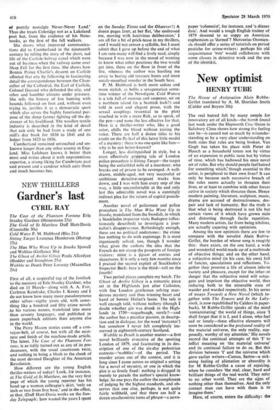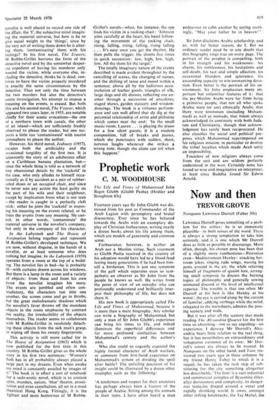New optimist
HENRY TUBE
The House of Assignation Alain Robbe- Grillet translated by A. M. Sheridan Smith (Calder and Boyers 30s) The real hatred felt by many people for innovatory art of all kinds—the bomb found last week under the Hepworth Crucifixion in Salisbury Close shows how strong the feeling can be—is caused not so much by misunder- standing as by a very clear understanding on both sides that rules are being broken. Van Gogh has taken his place with Pieter de Hooch as a household totem not by virtue of an expansion in public taste but by virtue of time, which has hallowed his once novel set of rules. But why should people feel hatred for something which: though essential to the artist, is peripheral to their own lives? It can only be because each successive breach of the rules seems actually to threaten their lives, or at least to combine with other forces active in society which threaten them. Hence modern painting, literature, sculpture, music, drama are accused of destructiveness, des- pair and lack of humanity. But the truth is that what is being destroyed is not life but certain views of it which have grown stale and distorting through facile repetition. Many modern artists, far from being nihilists, are actually capering with optimism.
Among the new optimists there are few to compare with the novelist Alain Robbe- Grillet, the burden of whose song is roughly this: there exists, on the one hand, a wide and wonderful world made up of a multitude of objective things; and on the other hand, a subjective mind (in his case, his own) full of fancies, speculations and reflections. To- gether they promise a life of almost infinite variety and pleasure, except for the inherent danger that the subjective mind will subju- gate and imprison the objective world, thus reducing both to the miserable state of warder and warded respectively. In his series of essays Towards a New Novel (which to- gether with The Erasers and In the Laby- rinth, is now republished by Calders in paper- back), M Robbe-Grillet speaks of the mind 'contaminating' the world of things, since 'I shall forget that it is I, and I alone, who feel sad or lonely—these effective elements will soon be considered as the profound reality of the material universe, the only reality, sup- posedly, worthy of my attention.' His novels record the continual attempts of this 'I' to inflict meaning on 'the material universe' and its continual failure to do so. But this division between 'I' and the universe which gave earlier writers—Camus, Sartre—a sick- ening feeling of alienation or absurdity is for M Robbe-Grillet a cause of rejoicing, when he considers 'the real, clear, hard and brilliant things of the real world. They refer to no other world. They are the signs of nothing other than themselves. And the only contact man can have with them is to imagine them.'
Here, of course, enters the difficulty: the novelist is well placed to record one side of the Mak, the 'I', the subjective mind imagin- ing the material universe, but how is he to give equal weight to the 'things', since by the very act of writing them down he is alter- ing them, 'contaminating' them with his feelings? In his first novel, The Erasers, M Robbe-Grillet borrows the form of the detective novel and by the somewhat desper- ate expedient of having his murderer only wound the victim, while everyone else, in- cluding the detective, thinks he is dead, con- trives to have the victim properly murdered in exactly the same circumstances by the detective. Thus not only the time between the two murders but also the detective's entire investigation, his attempt to impose a meaning on the events, is erased. But both this and his second novel, The Voyeur, which appeared two years later, in 1955, are notable chiefly for their scenic evocations—the one of a northern town with canals, the other of an island—which are sufficiently freshly observed to please the reader, but one sus- pects a little too 'contaminated' with tourist atmosphere to please the author.
However, his third novel, Jealousy (1957), escapes both the artificiality and the occasional turgidity of the first two. It is apparently the story of an adulterous affair on a Caribbean banana plantation, but— since the whole thing is told as a network of tiny obsessional details by the 'cuckold' in the case, who only alludes to himself occa- sionally as if by accident as a pair of rubber- soled shoes or an occupied chair, and since he never sees any action the least guilty on the part of his wife and their neighbour, except by implication from what is not seen —the reader is caught in a perfectly cleft stick: either he joins the 'cuckold' in impos- ing his meaning on the events related, or he frees the events from any meaning. He can- not, in other words, `contaminate' the material universe in the novelist's company, but only in the company of his character.
In the Labyrinth and The House of Assignation belong together and represent M Robbe-Grillet's developed technique. We are now, without disguise, in the hands of a novelist, or at least someone who does nothing but imagine. In the Labyrinth (1959) operates from a room at the top.of a build- ing. The novelist lies in bed—he is probably ill—with curtains drawn across his windows. But there is a lamp in the room and a variety of objects: from these and from his own fever the novelist imagines his story. The events are jumbled and often con- tradictory, the characters run into one another, the scenes come and go in throbs, but the great melodramatic shadows which the novelist's fever throws off the mundane objects in the room emphasise by contrast the reality, the irreducibility of the objects themselves. The reader seems to collaborate with M Robbe-Grillet in resolutely detach- ing these objects from the sick man•'s grasp, in wiping off them his sweaty fingerprints.
This activity is still more called for in The House of Assignation (1965) which is now published for the first time in this country. M Robbe-Grillet gives us the whole story in his first two sentences: 'Women's flesh has in all probability always played a large part in my dreams. Even when awake my mind is constantly assailed by images of It.' The book is in effect a sort of notebook for a sado-erotic novel, which is to contain spies, murders, opium, 'blue' theatre, prosti- tution and even cannibalism, all set in a most theatrical Hong Kong. Fittingly, it is the lightest and most humorous of M Robbe-
Grillet's novels—when, for instance, the spy finds his victim in a rocking-chair: 'Johnson aims carefully at the heart, his hand follow. ing the movement of the rocking chair, rising, falling, rising, falling, rising falling . It's easy once you get the rhythm. He then pulls the trigger. He shoots five times in quick succession: low, high, low, high, low. All the shots hit the target.'
The totally imaginary nature of the events described is made evident throughout by the cancelling of scenes, the changing of names, and the shifting of tense and mood within a sentence; above all by the ludicrous accu- mulation of leather goods, triangles of silk, large dogs and slit dresses, reflecting one an- other through a succession of anecdotes, staged shows, garden statuary and window- dressings. The book is a virtuoso perform- ance and can well afford that sly dig at the perennial relationship of artist and philistine which comes near the end: 'In the small music-room, Lauren ... is playing the piano for a few silent guests; it is a modern composition, full of breaks and pauses, which she punctuates with sudden, short, nervous laughs whenever she strikes a wrong note, though she alone can tell when this happens.'



































 Previous page
Previous page